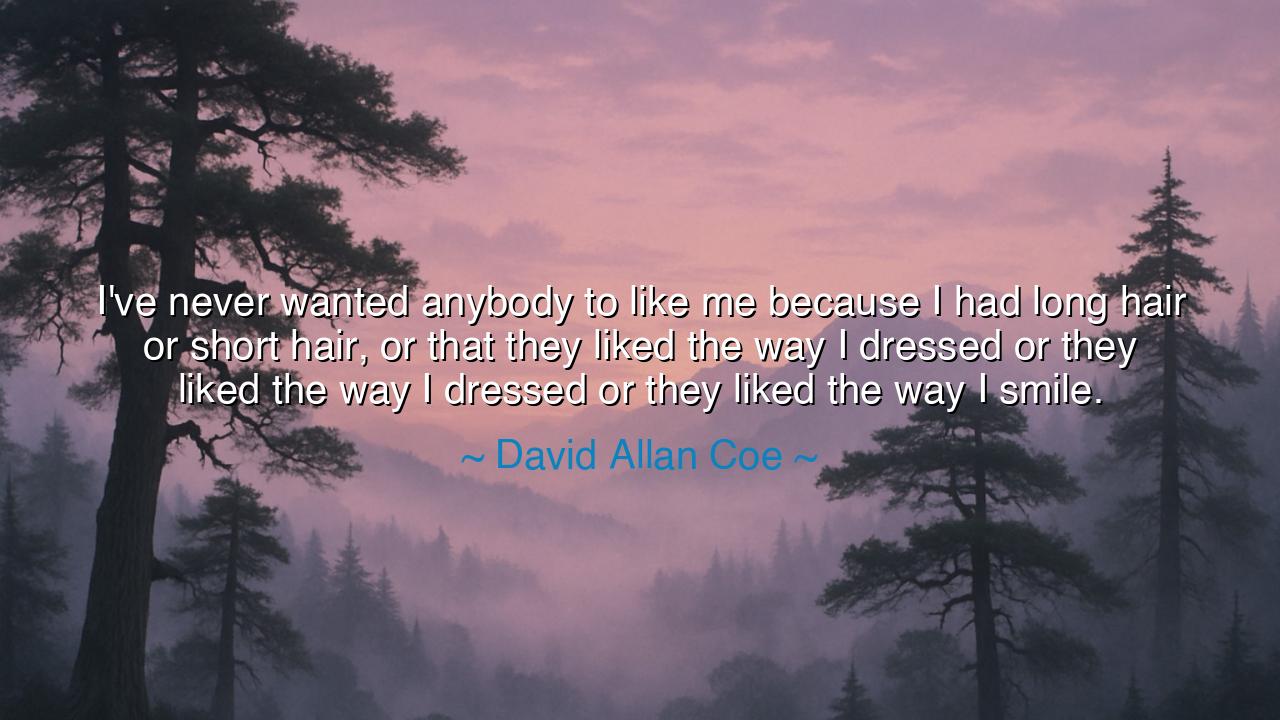
I've never wanted anybody to like me because I had long hair or
I've never wanted anybody to like me because I had long hair or short hair, or that they liked the way I dressed or they liked the way I dressed or they liked the way I smile.






The words of David Allan Coe, “I’ve never wanted anybody to like me because I had long hair or short hair, or that they liked the way I dressed or they liked the way I smile,” are not the boast of a man indifferent to others, but the cry of one who seeks truth beyond appearances. In these words, we hear a rejection of shallow judgments, of fleeting fashions, of masks that fade with time. He speaks as one who has wrestled with the world’s gaze and chosen to be seen not for the outer garment but for the soul within.
The ancients, too, knew this wisdom. They taught that beauty of form is a flame that flickers and dies, but beauty of spirit is a fire that burns eternal. Coe’s rejection of being loved for his hair, his clothes, or his smile, is a call to all who would hear: seek relationships founded upon essence, not ornament. For the ornaments of the body change as the seasons, but the essence of character is the root that endures through storm and drought alike.
Consider the tale of Diogenes the Cynic, who lived in poverty, clothed himself in rags, and dwelt in a barrel. Many mocked his appearance, many scorned his unkempt form. Yet when Alexander the Great, the most powerful man of his age, came to him and asked if he could grant him anything, Diogenes replied, “Stand out of my sunlight.” In that moment, the ragged philosopher revealed a truth greater than power or wealth: that the spirit unbound by appearances cannot be conquered. Like Coe, he did not wish to be esteemed for the garment upon his body, but for the freedom of his soul.
This teaching is no easy path, for the world delights in surfaces. Men and women alike are judged by the cut of their hair, the shape of their garments, the charm of their smile. But to live as Coe proclaims is to rebel against such chains. It is to declare, “You may see me as plain, as wild, as unrefined, but if you know me truly, you will know my worth.” This is the heroism of authenticity, the courage to stand naked in spirit before the eyes of others, unadorned yet unashamed.
The deeper meaning of Coe’s words lies in his desire for authentic connection. To be liked, not for the costume one wears, but for the truth that dwells beneath, is the yearning of every soul. For what is friendship, what is love, if it rests upon fragile appearances? Such bonds break like clay in the fire of adversity. But when one is loved for the essence of their being, then that bond is strong as iron, enduring through every season of change.
The lesson here is clear: adornments may delight the eye, but they cannot feed the heart. Seek to be known for who you are, not what you wear. And likewise, do not honor others for the silk upon their backs or the curve of their smile, but for the flame of their spirit, the strength of their honesty, the depth of their kindness. This is the vision that endures when the beauty of the body withers away.
To practice this truth, begin with yourself. Each day, ask: do I seek approval for my appearance, or for my character? Choose to build the latter. Show kindness, speak truth, stand firm in integrity. And when you meet others, look beyond the veil—seek their struggles, their virtues, their soul. In this way, you will live the wisdom of Coe, and your relationships will be forged in fire, not in straw.
So let this teaching echo through the ages: do not live to be liked for your hair, your dress, or your smile. Live to be known for the spirit that dwells within. For fashions fade, smiles falter, and hair turns gray, but the soul endures—and it is there that true greatness is found.






AAdministratorAdministrator
Welcome, honored guests. Please leave a comment, we will respond soon